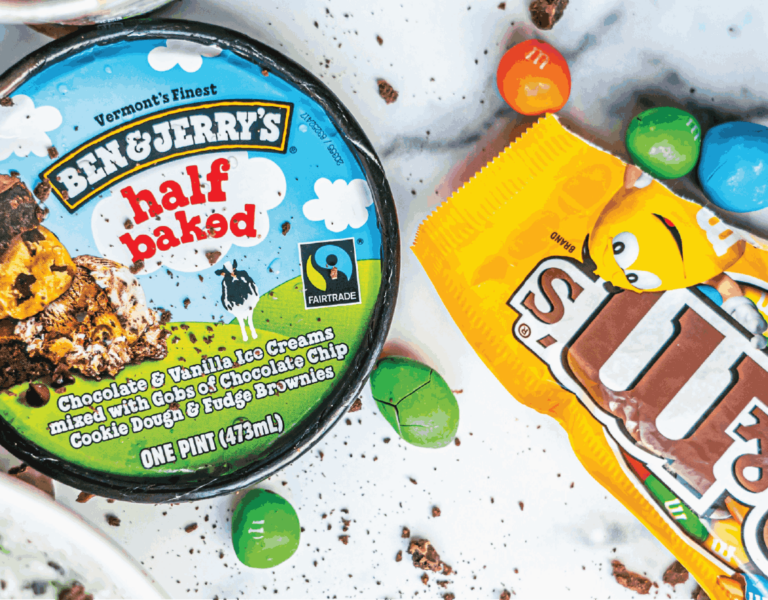Unilever’s decision to spin off Ben & Jerry’s along with its ice cream business has fed the misconception of “Go woke and go broke.” The real lesson to take away from the split is the opposite—that purpose pays—and it’s more important than ever to be future-focused in order to grow.
Did the forces of “woke capitalism” just suffer a decisive defeat on the culture-war battlefield?
You could be forgiven for thinking so. Parent company Unilever recently announced plans to sell off Ben & Jerry’s, a company long known for its public stances on progressive social issues. Some news outlets and social media pointed to this as proof that companies with a social purpose make for bad business. The “go woke, go broke” memes have gotten renewed life, with many arguing that the ice cream brand’s overt support for the Palestinian cause, Black Lives Matter and Native American rights became too much of a reputational headache and financial drag for the U.K.-based consumer goods giant.
They’re wrong. First, because the facts of the situation show that Unilever’s decision had nothing to do with Ben & Jerry’s social activism, and everything to do with the future of its business. And second, because these commentators are missing the point of what it means to be a purpose-driven company and why that’s the critical driver for being a successful business today.
Recent culture-war flare-ups over companies “going woke” and suffering consumer boycotts have persuaded some CEOs that having a purpose beyond making money is a high-risk tactic and that it’s better to focus on business basics. But the evidence points elsewhere.
This Isn’t About Purpose. This Is About Ice Cream.
Unilever isn’t just selling Ben & Jerry’s; it’s spinning off its entire ice cream division. The company’s new CEO has come under intense pressure from activist investor Nelson Peltz to clean up its balance sheet and focus on growth. Ice cream is a notoriously low-margin business. It requires expensive ingredients like milk and fresh fruit. And selling ice cream is a seasonal business that demands a complex refrigerated supply chain. Compare that to other Unilever products like soap and detergent and mayo. Those products are comparatively easy to make and can sit on shelves for months or years. If the problem was Ben & Jerry’s, the company would be holding on to Wall’s, Cornetto and the rest of their ice cream equities. Only the woke kids would be getting dumped.
Purpose Actually Pays.
Ironically, Ben & Jerry’s bona fides as a purpose-driven company are actually a point in their favor. While many of us are looking for the trade-off between purpose and performance, the data indicates that purpose actually improves performance. Last year, my colleagues at Jump Associates completed a study that showed purpose-driven companies do far better than their peers. We found that over a twenty-year period, purpose-driven companies delivered market returns that were 3X their closest competitors and 5X the S&P 500. Ice cream may not pay, but being purpose-driven does.
Moreover, a fundamental shift in consumer behavior actually puts Ben & Jerry’s on the right side of history. More and more, consumers aren’t just buying things. They’re buying into things. Companies like Ben & Jerry’s, Whole Foods Market and Starbucks that stand for something more than just making money are aligned with consumers’ search for greater meaning. People are shopping in line with their values, and sizable majorities of Americans are in favor of so-called “woke” causes like racial justice, gay and transgender rights, reproductive freedom and stricter gun control.
To be sure, companies risk running into damaging controversies if their internal values fall out of step with the values of their customers. Witness the consumer backlash last year over Bud Light’s hiring of a transgender influencer on Instagram. Their problem wasn’t about being woke. It was about not being customer-centered. For Bud Light drinkers, the move was a bridge too far.
A truly purpose-driven company doesn’t just jump on the latest social trend with performative campaigns. Its purpose is carefully aligned with the core values of its workforce, its customers and its partners. Think of how Patagonia has established itself as the company that puts the planet’s future ahead of profits, sending a crystal clear message about who should work for it, buy from it and partner with it. A purpose doesn’t have to lead a company into political firestorms or social controversy. It can be as simple and apolitical as Starbucks’ stated mission to “nurture the limitless possibilities of human connection.” It just has to be authentic.
Ben & Jerry’s is a truly purpose-driven company. And yes, it’s a progressive one. After all, the company is based in Vermont, the state represented by Bernie Sanders. It lives the values it promotes, winning a loyal following among the large tribe of consumers who share its views.
Ironically, the media’s attention on the spin-off is an indication of where real value resides. No headline said “Unilever spins off Magnum, Wall’s, Cornetto and its other ice cream brands.” They mentioned Ben & Jerry’s. That’s a sign that being purpose-driven matters.
The Real Lesson Is About Being Future Focused.
Spinning off Unilever’s ice cream business isn’t a referendum on being purpose-driven. It’s a referendum on being future-focused.
Some categories are on the right side of history: they’re in line with the way the world is moving. Others are swimming against the tide—and their leaders need to come up with a strategy that puts their company on the right side of history, both in terms of their values and the market they’re playing in.
Climate change will only become a more pressing issue. America will continue becoming a majority-minority nation. Healthier eating and the emergence of weight-loss drugs like Ozempic will mean shrinking demand for less nutritious, high-calorie foods. And AI will play an increasingly central role in our work and our lives.
Even if Ben & Jerry’s is on the right side of history with its social stances, it’s poorly positioned for the future. Why? Because it’s been playing in the wrong place for too long, swimming against the tide of health-conscious eating that threatens every ice cream maker and every snack food producer. You and I will probably eat more fresh food in the next few years. We probably won’t eat as much ice cream. That lack of a future-focused growth story is untenable when a company like Unilever is under pressure to grow.
Ben & Jerry’s should have jumped on the healthy eating trend years ago by leveraging its powerful, purpose-driven brand to break into categories like greek yogurt, nutritious snack bars and nut milks. That was admittedly hard to do when it was managed as part of an ice-cream business unit.
Oops! We could not locate your form.
Giant conglomerates like Unilever often struggle to get the best out of purpose-driven companies and risk undermining their value as a result. Unilever is all about selling household products to a mass market, and it never figured out how to scale the quirky, socially noisy ice cream maker. This should be a cautionary tale for a company like Amazon, which has yet to convincingly show that it knows how to leverage the strengths of purpose-driven Whole Foods seven years after acquiring it.
Any savvy buyer should consider peeling off Ben & Jerry’s from the other ice cream businesses. And they should quickly explore opportunity spaces that help bring the company’s purpose to life in more health-focused categories.
For the rest of us, we’d be wise to not take away the wrong lesson from Unilever’s spinoff. Leaders at purpose-driven companies needn’t lose faith. The numbers are on their side. By drawing the wrong conclusion from culture-war flare-ups like these, other companies are leaving value on the table and strengthening the advantage of the few who understand that having an authentic purpose—while keeping an eye sharply focused on the future—is the most important strategic differentiator there is.
This article appeared in Forbes on March 31, 2024.

 Dev Patnaik
Dev Patnaik



